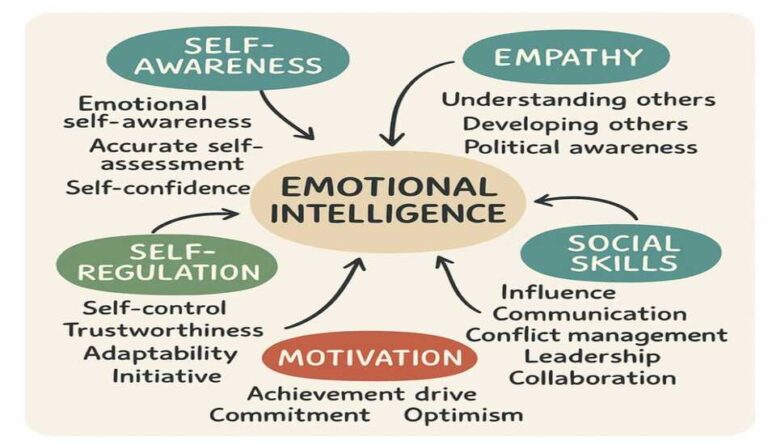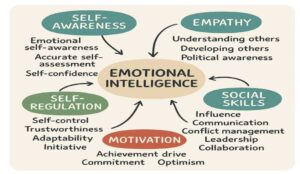Given the current situation, it’s essential to exercise caution and sensitivity in our expressions. To promote understanding and empathy, let’s focus on sharing thoughtful and respectful content. By practicing emotional intelligence, we can navigate these challenging times with compassion and wisdom.
Emotional Intelligence: A Profound Exploration in Psychological, Philosophical, and Social Contexts
Emotional Intelligence (EI) is the ability to recognize, understand, manage, and influence one’s own emotions and those of others. When external circumstances are beyond our control, EI becomes a crucial tool for navigating adversity, maintaining mental resilience, and fostering meaningful relationships. To fully grasp its significance, we must examine EI through psychological, philosophical, and social lenses.
Psychological Perspective: The Science of Emotional Mastery
Psychologically, EI is rooted in cognitive and affective neuroscience. Daniel Goleman popularized the concept, but its foundations trace back to earlier psychologists like Peter Salovey and John Mayer, who defined EI as comprising four key abilities:
- Perceiving Emotions – Accurately identifying emotions in oneself and others.
- Using Emotions – Harnessing emotions to facilitate thinking and problem-solving.
- Understanding Emotions – Grasping emotional complexities, transitions, and causes.
- Managing Emotions – Regulating emotions for personal growth and social harmony.
Neuroscientific research shows that EI is linked to the prefrontal cortex (responsible for self-regulation) and the amygdala (the emotional response center). High EI individuals exhibit greater emotional resilience, reduced stress responses, and improved decision-making. In uncontrollable situations, they employ cognitive reappraisal—reframing distressing events in a constructive manner—rather than suppressing emotions, which can lead to psychological distress.
Studies also highlight EI’s role in mental health. People with high EI experience lower anxiety and depression because they process emotions adaptively rather than being overwhelmed by them. Thus, psychology positions EI as a buffer against life’s unpredictability.
Philosophical Perspective: Stoicism, Existentialism, and Emotional Wisdom
Philosophically, EI resonates with ancient and modern thought traditions.
- Stoicism – Stoic philosophers like Epictetus and Marcus Aurelius emphasized controlling reactions to external events, famously stating: “We cannot choose our external circumstances, but we can always choose how we respond to them.” This aligns with EI’s emphasis on emotional regulation. Stoicism teaches acceptance and rational detachment, allowing individuals to maintain equanimity amid chaos.
- Existentialism – Thinkers like Jean-Paul Sartre and Viktor Frankl argued that while life’s circumstances may be uncontrollable, humans possess the freedom to assign meaning to their suffering. Frankl’s logotherapy (finding purpose in pain) mirrors EI’s principle of using emotional awareness to derive strength from adversity.
- Eastern Philosophies – Buddhism’s concept of mindfulness—observing emotions without attachment—parallels EI’s self-awareness and regulation. The Taoist principle of Wu Wei (effortless action) suggests flowing with emotions rather than resisting them, a key EI strategy.
Philosophy thus enriches EI by framing it not just as a skill but as a way of being—an intentional approach to life’s uncontrollable nature.
Social Perspective: EI as the Glue of Human Connection
Socially, EI is indispensable for maintaining harmony in relationships, workplaces, and communities.
- Empathy and Compassion – High EI individuals excel in perspective-taking, allowing them to connect deeply with others. In crises, empathetic leaders (like Nelson Mandela or Mahatma Gandhi) harness EI to unite people rather than escalate conflict.
- Conflict Resolution – Uncontrollable situations often breed tension. EI enables active listening and non-reactive communication, transforming disputes into collaborative problem-solving.
- Social Resilience – Societies with collective EI (e.g., cultures emphasizing emotional expression like Japan’s “honne and tatemae” or Scandinavian emotional openness) recover faster from collective trauma.
Moreover, EI combats emotional contagion—the spread of negative emotions in groups. During pandemics or economic crises, emotionally intelligent leaders mitigate panic by modeling calm and clarity.
Synthesis: EI as the Ultimate Adaptive Tool
When control is lost, EI provides agency over the internal world when the external world is chaotic. Psychologically, it safeguards mental health; philosophically, it offers wisdom to endure suffering; socially, it sustains connections when isolation threatens.
In an unpredictable world, EI is not just an option—it is the keystone of human resilience. By mastering emotions, we master our existence.








Very nicely explained.
Thanks.